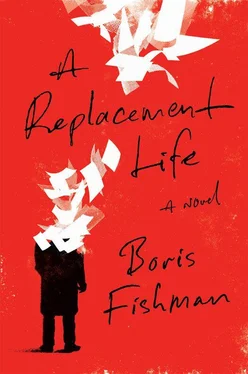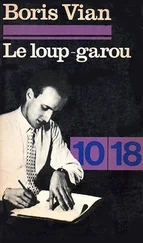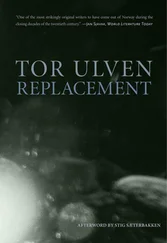“To either of us,” Slava said.
“Well.”
“Well.”
“I don’t know what you want me to say.”
Slava was too tired to talk. Drunkenness had left him, as if he were an inhospitable host. Only weariness remained. It was a special kind of weariness that descended rarely, according to internal chemical regimens he did not understand. It made striving difficult, but also falsehood.
“She was in the ghetto,” Grandfather said at last. “She escaped. She weighed nothing — the partisans lived on potato peels in the woods. They waded through swamps for so long her skin came off with the boots. They had her run a herd of cows.”
“Cows?” Slava said.
“Cows. I don’t know.”
“What else?”
“What else. She watched a woman in a bunker choke her child to death. There were fascists upstairs. The baby was crying, giving everyone away.” He summed up: “It’s not pleasant.”
Slava cleared his throat. “What about her parents?”
“Her father asked her to come back to the ghetto and get them, but her mother said no. ‘Get out, find your sister, don’t come back.’ Her sister had slipped out already. Imagine leaving your parents and they’re killed a month later.” He paused. “That’s all I know. She didn’t want to talk about it.”
They were quiet for a minute. “Don’t tell a single soul,” Slava said.
“Who would I tell?” he said.
“Swear,” Slava said.
Grandfather swore.
“Family,” Slava said bitterly.
“Ho, listen. I called a couple of stores — nobody has this Sancher. How far do you want me to go?”
“Don’t worry about it,” Slava said.
“No, I’ll get it for you.”
“Don’t worry,” Slava said, and hung up.
Cows. What would partisans, who had to hide and move often, want with cows? Milk, obviously. Did they slaughter them for food? But why would they have put a fifteen-year-old city girl in charge of a herd of cows? Punishment? Even anti-fascist partisans had no special fondness for Jews.
What else did she do during those days and nights, the weather growing cold, the breastplate of the sky turning a bruised black under its necklace of stars? Night watch. (Why not.) Yes, he kept going: During the days, she tended cows, and at night, she kept watch for the camp. “Take pity on a young girl,” Slava imagined an older man who knew her from the neighborhood appealing to Zelkin, the commander. Zelkin spat: “You think there are such things as children and adults in a war?” He was respected because he did not take advantage of the young girls the way some commanders did, so the neighborhood man said nothing further.
Slava emerged from the bathroom and was momentarily shocked to rediscover Arianna Bock in his bed. The last two days had brought oddity into his life. “They waded through swamps for so long her skin came off with her boots,” he said to Arianna’s gently rising and falling form. “She ate potato peels. Her first normal meal, she threw up. She ate so fast, shoveling it into her mouth, she threw up.”
Arianna didn’t answer. He nodded and moved off toward his desk. He switched on his laptop and shifted the desk light away from Arianna. She released a startled snore and went back to soundless sleep.
Cows, cows, cows. Now his grandmother would talk to him. Now it was no imposition. Now he would follow the movements of her mouth. Now he would embrace her and not let go until he could speak as her, until they became the same person.
Sofia Dreitser, fifteen, originally of Karastoyanova Street #45, then, after being penned in the ghetto, of Vitebskaya #111, now of camouflaged zemlyanka #6 if you were counting from the bent birch with the bark like split skin. Not that she used the zemlyanka overmuch. During the day, she looked after the cows, her thumbs rigid from pulling on teats and her flanks bruised from the anemic knocks of their hooves, and then she sat up on the outskirts of camp in the crisp night, shivering under someone’s threadbare greatcoat, by her side a carbine she would not have known how to use. She slept for an hour or two in the morning after she was relieved, her dreams full of her father, who delivered goods by horse cart before the war, galloping in the dream with enormous blocks of ice, faster and faster, because the ice was melting in the hot air of the morning. Her free day was Sunday. She slept all day.
One afternoon, several sleepless nights behind her, she nodded off while the cows were grazing a kilometer from camp…
“NARRATIVE. Please describe, in as much detail as you can, where the Subject was during the years 1939 to 1945.”
… I thought I had been asleep for a minute, but when I awoke, the sun had traveled half the arc of the sky. The animals were gone.
One of the partisans, a Belarusian named Piotrus, said that because I’d lost the cows, I should be killed. One less mouth to feed, what with no cows to supply the grub. Piotrus was a pariah in Khutorka, his village, because he had gone with the partisans. Most of the Belarusians, who had been thrown around by the Russians and Poles for as long as anyone could remember, were only too happy to take up with the Germans. But Piotrus was old enough to have watched Russian limbs split off by German machine guns in the First World War. So he went with the partisans. To the villagers, he became a Jew lover, because the partisans sometimes took in Jewish fighters. Piotrus couldn’t even come back for a meal at his mother’s. So he spent all his time thinking of ways to restore his credentials as an anti-Semite.
In our unit we had never had to kill one of our own. We had ambushed a German provisions truck once, the front tires busted by the tines of a pitchfork Livshitz had spent half the night burying in the dead earth. And we had executed a Belarusian collaborator. He was slurping his tea, a sugar cube still in his teeth as he crashed to the floor, his parents observing the scene with gloomy resignation. But never one of our own.
Zelkin (the commander), Piotrus, and several others were conferring inside the small tent where Avdosya baked bread. I had been placed in a makeshift jail. Tsadik, one of the children we got after the Nazis scattered the Minsk orphanage, was listening in and reporting back to me. Bullets were precious, so the idea of a shooting was dismissed. To build a gallows in the middle of the forest when we might have to move at any moment seemed absurd.
As they sat there and pounded moonshine we had taken from the Belarusian collaborator, there was a distant mooing. They were coming back on their own! I leaped from my seat; Piotrus ran out of his tent, squinting. (He fancied himself a big shooter and was always taking aim at things, even a piece of bread before tearing into it.) And then, behind the sluggish mooing of the cows, there was that terrifying sound. It chopped through the air, then stretched like a string of sap. German.
In that moment, stupidly, I couldn’t help thinking how much like our Yiddish it sounded. I hadn’t spoken a word of it since the night I had slipped out of the ghetto. Suddenly — what a stupid thought when your life is about to end — I missed it terribly . Fargideynk di veg , my father had said before I left. Remember the way. “Come back for us. We’re young yet, we can work. We can be useful.” For the first time in my memory, my mother interrupted him. “You go and never come back. Find your sister, stay together. I don’t want to see you here again.” She was trying so hard to look stern, and I didn’t argue because I didn’t want to embarrass her.
The Minsk ghetto was liquidated one month later. “Liquidated”—what a strange word. It makes me think of a deluge, waters rushing in a stream, clear and cleansing. Every last person was killed. To this day, I can’t remember my mother’s face clearly. My father’s face, I can remember every crease and warp. My mother’s face is a blank.
Читать дальше











